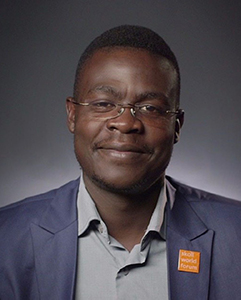Fhazhil Wamalwa, Ph.D.
Assistant Professor of Electrical Engineering
Discipline: Electrical Power Systems
Office: SEIC 347
Email: Fhazhilsw@sfsu.edu

Education:
Ph.D., Sustainability, Rochester Institute of Technology, Rochester, NY, 2024
MEng., Electrical Engineering, University of Pretoria, Pretoria, South Africa, 2017
BEng., Electrical Engineering, University of Pretoria, Pretoria, South Africa, 2016
B.S., Electrical and Electronics Engineering (major: Power Systems), Jomo Kenyatta University of Agriculture and Technology, Nairobi, Kenya, 2012
Biography
Dr. Fhazhil Wamalwa joined San Francisco State University (SFSU) in August 2024 as a faculty member in the Electrical Engineering Department. His interdisciplinary research interests include microgrid modeling and optimization, grid integration of renewable energy resources, electric vehicle (EV) charging infrastructure planning and grid integration, power systems studies in the context of climate change, and energy efficiency and demand-side management.
Dr. Wamalwa’s previous research focused on applying optimal control theory to the modeling and optimization of hydropower systems and renewable-based microgrids, as well as the integrated planning of rural electrification and irrigation systems in Sub-Saharan Africa. His work has been published in peer-reviewed journals, including Energy Conversion and Management, Renewable Energy, and Energy for Sustainable Development. He has also presented at prestigious conferences, such as the International Conference on Applied Energy and IEEE conferences.
Before joining SFSU, Dr. Wamalwa was a teaching faculty member in Electrical Power Systems Engineering (EPSE) at the African Leadership College (ALC) in Mauritius, an affiliate of Glasgow Caledonian University (GCU) in the UK.
Selected Publications
Journal papers:
-
Wamalwa, F., Sichilalu, S., & Xia, X. (2017). Optimal control of conventional hydropower plant retrofitted with a cascaded pumpback system powered by an on-site hydrokinetic system. Energy Conversion and Management 132, 438-451.
-
Sichilalu, S., Wamalwa, F., & Akinlabi, E. (2019). Optimal control of wind-hydrokinetic pumpback hydropower plant constrained with ecological water flow. Renewable Energy (2019).
-
Wamalwa, F., Maqelepo, F., & Williams, N. Unlocking the nexus potential: A techno-economic analysis of joint deployment of minigrids with smallholder irrigation. Energy for Sustainable Development 77.
-
Wamalwa, F., Maqelepo, L., Williams, N., & Falchetta, G. (2024). Solar irrigation potential in Sub-Saharan Africa: a crop-specific techno-economic analysis. Environmental Research: Food Systems 1 (2), 025001
Conference papers:
-
Wamalwa, F, Izar-Tenorio J.L, & Williams, N. "Spatial assessment of solar PV-based irrigation potential in Kenya," 2022 IEEE PES/IAS PowerAfrica, 2022, pp. 1-5.
-
Wamalwa, F & Williams, N, "Integration of an off-grid solar-PV-battery system after grid connection using model predictive control: A case study in Kenya," 2021 IEEE PES/IAS PowerAfrica, 2021, pp. 1-5.
-
Wamalwa, F., Sichilalu, S., & Xia, X. (2017). Optimal control of hydrokinetic-powered pumpback system for a hydropower plant in dry season. Energy Procedia 105, 94-101.
-
Wamalwa, F., Sichilalu, S., & Xia, X. (2017). Optimal energy mix of a microhydro-wind-grid system powering a dairy farm in Western Cape, South Africa. Energy Procedia 142, 708-715.